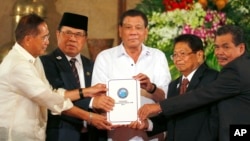The Philippine government's pick of transitional leadership for a newly formed Muslim autonomous region shows early signs of isolating armed rebel groups that hoped to share power, threatening the region's long-term stability.
Philippine President Rodrigo Duterte late last week named the chairman of the Muslim rebel group Moro Islamic Liberation Front as interim chief minister of a transition authority for the region, which will cover about 4.3 million people and get special government funding as well as control over some natural resources.
The pick for chairman and the front's majority of seats in the new agency give it a lead over 20 other armed groups that have advocated Muslim autonomy on the southern island of Mindanao. Rebel violence has left about 121,000 people dead in Mindanao since the 1960's, giving the island a bad reputation among tourists and investors..
But analysts fear the exclusion of other groups could lead to rebel-vs-rebel struggles that eventually could hobble the government’s goal of using the autonomous region to keep peace.
The Moro National Liberation Front -- an organization unrelated to the other front -- complained Sunday when it got just five of the 80 transition authority seats, domestic media reported. The Moro Islamic Liberation Front got 41.
“With Muslim groups, the main issue is that they’re not necessarily speaking for everyone, and so you now have a situation where you need to deal with complaints about being excluded from the process,” said Herman Kraft, political science professor at the University of the Philippines Diliman.
“I think it goes beyond the idea of what the groups are actually fighting for,” Kraft said. “It’s really more a question of who claims to represent the interests of the Muslims in the Philippines.”
Presidential mandate
Duterte told the chairman, Al Haj Murad Ebrahim, to use “democratic values” in building up the autonomous zone, called the Bangsamoro Autonomous Region of Muslim Mindanao. The Moro Islamic Liberation Front signed a 2014 peace deal with the government, agreed to disarm and helped officials set up the new region.
“Always work for the best interest and welfare, not only of the Bangsamoro people but every Filipino who lives in that region,” Duterte said, as quoted on the presidential website.
In July, Duterte signed a law authorizing the region’s formation on 12,536 square kilometers of land. Officials hope the region will offer some of the self-rule that Muslims have sought for some 500 years in the majority Catholic country. That outcome could in turn ease fighting and let Mindanao develop economically via new infrastructure and investment.
“The key word is ‘build and they will come,’” said Jonathan Ravelas, chief market strategist with Banco de Oro UniBank in Metro Manila. “If you build infrastructure, businesses will come and eventually you’ll get to see interested investors.”
Insiders, outsiders
Multiple rebel groups would hope to help steer the autonomous region so they get access to resources and legitimacy for their own stakeholders, who include specific southern Philippine ethnic groups and large families.
The Maute Group, for example, drew support from an influential family as it fought a five-month war with troops in 2017. Groups excluded from the autonomous region’s leadership will stay intact as new ones form, said Enrico Cau, associate researcher at the Taiwan Center for International Strategic Studies.
“You will have instability in the region from new splinter groups that are nothing but ammunition of the bigger groups trying to get their things done,” Cau said.
Mindanao’s most internationally known rebel group, Abu Sayyaf, has built connections with the Middle Eastern terrorist sponsor Islamic State since 2016. Abu Sayyaf periodically kidnaps and beheads foreign tourists. It took credit in January for two deadly church bombings in Sulu province, where voters had just rejected joining the autonomous region. Some scholars saw the bombings as an Abu Sayyaf protest against the region’s formation.
Duterte responded by commanding troops to “crush” Abu Sayyaf, his office website says.
The Moro Islamic Liberation Front will need to reach out effectively to other rebels as well as indigenous populations and Mindanao’s Christians who live in the autonomous region, Cau said.
“The MILF leadership should be expected given that it has been the negotiating party with the government throughout the peace process,” said Carl Baker, director of programs with think tank Pacific Forum CSIS in Honolulu. “The major problem with MILF leadership will be the lack of experience with governing a diverse region.”







